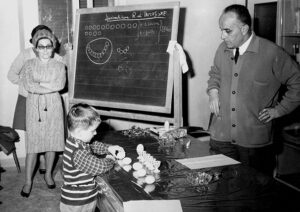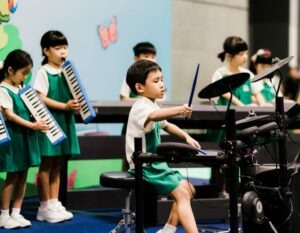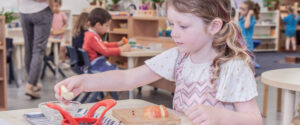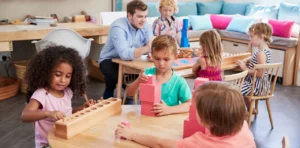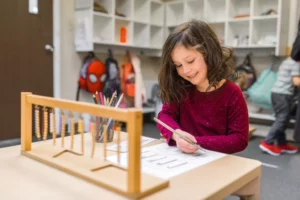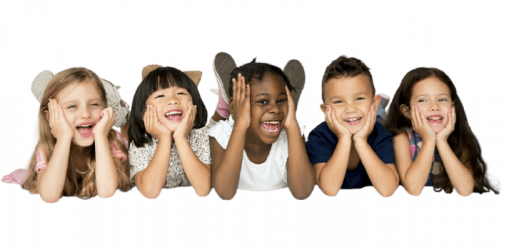Introduction: The Musical Roots of Montessori
In the realm of holistic education, Montessori stands out as a pedagogical approach that embodies the entirety of the child’s development. Among its diverse elements, music has a pivotal role in shaping a child’s cognitive, emotional, and social growth. It is not just an art form but a language that communicates the deeper layers of human consciousness. The deep connection between the Montessori method and musical instruction highlights how the two come together to foster an environment rich in sensory, cognitive, and emotional learning. She recognized its capacity not just as an art form, but as a potent tool for cognitive and emotional development. The union of music and Montessori is not just about learning scales or mastering an instrument. It’s about nurturing the whole child – mind, body, and spirit. hey are encouraged to listen, to move, to express, and to immerse themselves fully in the sensory experiences music provides. From the carefully designed musical activities that align with Montessori’s developmental stages, to the deep cognitive connections formed when rhythm and melody intertwine with learning, this journey promises to be both enlightening and harmonious. Let us tune our senses and set forth into the world of Montessori Melodies.
The Rhythmic Foundation of Learning
Dive into any Montessori classroom, and the rhythmic pulse of learning is palpable. This rhythm isn’t just about musical instruments or songs; it’s the inherent cadence of Montessori learning. Music provides a structure, much like the very skeleton of the curriculum. Each lesson, and each activity, resonates with a rhythm that aligns with the child’s innate pace of understanding. rhythm assumes a pivotal role in shaping the learning experiences of children. It’s not just a musical concept; it is, in essence, the cadence that governs our interactions, routines, and the very process of acquiring knowledge. From the moment a child is born, they are surrounded by rhythms. The consistent lullabies sung by their parents, the daily routines they observe, and even the rhythmic patterns of speech all contribute to their understanding of the world. When children are introduced to rhythmic activities in a Montessori setting, they aren’t just engaging in a fun exercise. They are fortifying crucial cognitive processes. Rhythmic patterns help hone memory skills, enhance concentration, and facilitate pattern recognition. In Montessori environments, rhythmic activities like dancing, instrument play, or even simple hand-clapping games are essential components.
Emotional Resonance: The Heartbeat of Montessori Music
Music, with its vast array of melodies and harmonies, mirrors the spectrum of human emotions. In Montessori education, music becomes a bridge to emotional intelligence. Children learn to associate sounds with feelings, cultivating an emotional vocabulary that is rich and varied. Through songs, rhythms, and instruments, they’re not just learning notes but the very nuances of human emotions. Historically and scientifically, music has been closely associated with emotional experiences. A melody can evoke a plethora of emotions, ranging from joy and nostalgia to sorrow and introspection. Music, with its vast emotional spectrum, serves as a vital tool in this endeavor. By engaging with different musical genres, rhythms, and instruments, children get an opportunity to explore their feelings in a safe and nurturing environment. This creative process is not about producing concert pianists or prodigious violinists, but about granting children an avenue to express their feelings. Whether it’s through simple percussion instruments, singing, or more advanced instruments, the act of creation enables children to resonate emotionally with the sounds they produce.
Cognitive Harmony: Music as a Tool for Brain Development
Numerous studies underline the connection between music and enhanced brain functionality. In Montessori’s vision, music is not an isolated subject but an integrated tool for cognitive development. The abstract concepts of mathematics, for instance, become tangible through musical patterns. Rhythmic counting paves the way for arithmetic, and scales become a playful introduction to ratios and fractions. Delving into the depths of music’s impact on brain development reveals a symphony of cognitive enhancements, from improved memory to advanced spatial reasoning. Listening to and creating music engages a vast network of neural pathways. As the child encounters different melodies, rhythms, and instruments, their brain actively processes these stimuli, strengthening and establishing new connections. Several studies have highlighted the link between musical training and improved memory. This is attributed to the fact that music, with its intricate patterns and sequences, trains the brain to remember complex structures. Music, by its very nature, demands concentration. Whether a child is deciphering the nuances of a new song, trying to stay in tune, or coordinating their hands to play an instrument, they are practicing sustained attention. Music, in the Montessori paradigm, transcends its traditional boundaries as an art form. It emerges as a catalyst for cognitive development, harmonizing various aspects of the brain’s functionality.
Social Symphonies: Building Bonds Through Beats
Music, in its very essence, is communal. In a Montessori setting, it becomes a medium for social interaction. Group songs, ensemble performances, and even the simple act of listening together can forge bonds of unity. Through these shared experiences, children learn cooperation, patience, and the joy of collective accomplishment. In the Montessori framework, which holistically interweaves various dimensions of learning, music plays an instrumental role in fostering social connections and nurturing interpersonal skills among young learners. Music offers children a medium to convey their emotions and stories without relying solely on words. This non-verbal form of communication is deeply expressive, allowing children to share their feelings, joys, and anxieties with their peers. Recognizing and empathizing with the musical expressions of their peers fosters understanding and deepens interpersonal connections. Music provides myriad opportunities for children to achieve and celebrate milestones, whether it’s mastering a difficult piece, performing in front of an audience, or collaborating on a musical project. The symphonies they create together are not just musical pieces but testimonies to the enduring power of shared human experiences.
Encouraging Creative Compositions
One of the cornerstones of Montessori education is fostering creativity. Music, being an expansive canvas of expression, offers endless possibilities. Children are encouraged not just to learn but to create. They compose, they improvise, and in the process, they find their unique voice in the vast choir of humanity. Music, a universal language, serves as an ideal conduit for fostering creativity. Every child is unique, with distinct preferences, strengths, and interpretations. The Montessori approach recognizes and celebrates this individuality. Music doesn’t exist in isolation, In a Montessori setting, the teacher acts more as a guide or facilitator rather than a traditional instructor.
Conclusion: A Crescendo of Lifelong Benefits
The role of music in Montessori education isn’t just about producing musicians. It’s about harnessing the universal appeal and benefits of melodies to foster well-rounded individuals. As children transition from Montessori environments to the larger world, they carry with them the harmonies of holistic learning, ready to contribute their unique notes to the global symphony. Through this holistic approach, children don’t just become composers; they become confident, innovative thinkers ready to leave their unique imprint on the world.


